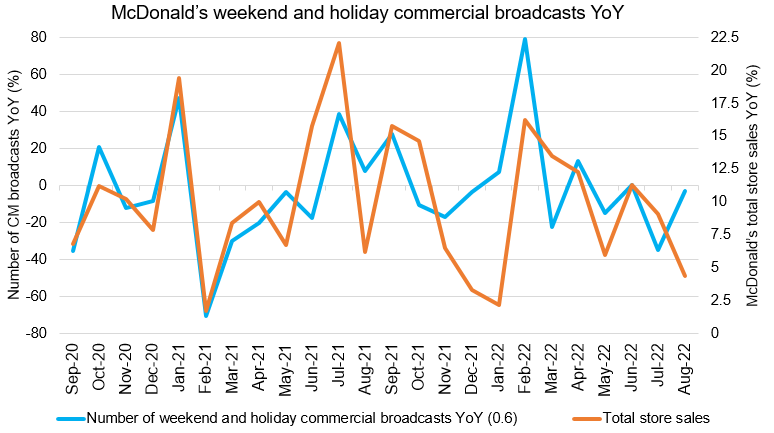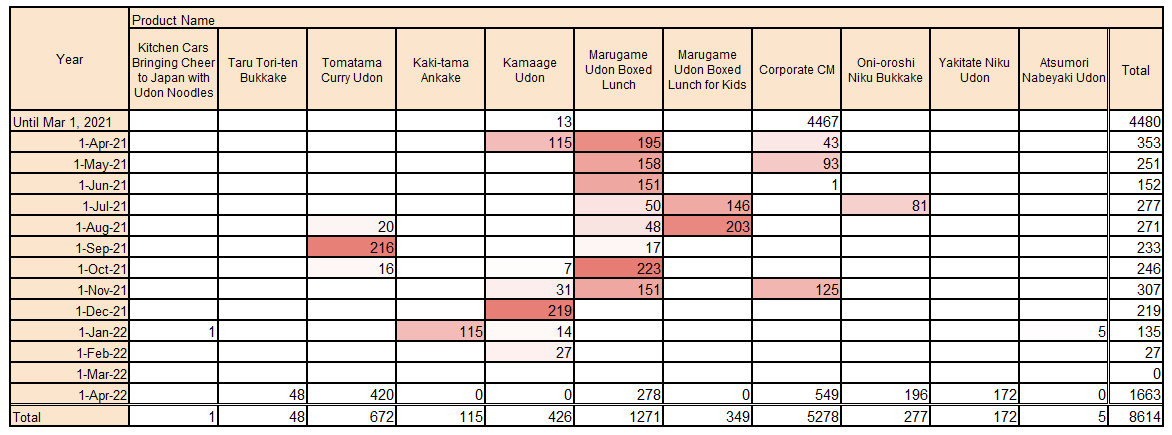Japan Markets ViewLooking Ahead at Corporate Performance with TV Data
Oct 16, 2023
Summary
- Provision of TV Metadata
QUICK provides a dataset of TV Metadata offered by M Data Co., Ltd. (M Data), linking them to securities codes. TV Metadata is the text data converted from TV programs and commercials. - Forecasting Monthly Sales
A comparison of monthly sales and the number of broadcasting commercials of McDonald’s Holdings Japan (2702) shows the strongest correlation with the sales on weekends and holidays. - Inferring Product Strategies
The products focused on by TORIDOLL Holdings (3397), which operates an udon noodles restaurant chain, “Marugame Udon,” could be identified from the number of broadcasting commercials, enabling us to predict the company’s product strategy before the official release of its financial results materials.
Features of TV Metadata
TV Metadata is generated using an original data collection system. It shows “when,” “where,” “who, what,” “how,” and “how many seconds, how many times” a certain company’s product was featured in a TV program. We conducted a case study based on the assumption that information obtained from TV influences consumer behavior. The study confirmed a correlation between TV information and sales.
M Data comprises four types of data on TV programs, TV commercials, products, and spots. The data can be offered also on the day of the broadcast. In this study, TV-CM (Advertising) data was used for verification. It is text data consisting of various information such as company names, product names, and the number of seconds of broadcasting time, etc.
Forecasting Monthly Sales
This study performed a comparison with the monthly sales of restaurant giant McDonald’s Holdings Japan (McDonald’s, 2702). The monthly sales are disclosed in the following month.
The monthly number of broadcasting McDonald’s commercials was counted and the YoY percentage change was calculated. They were compared with the YoY percentage change in sales of all stores. When compared to monthly sales for each of the patterns of all days, weekdays, weekends, and holidays, the correlation was strongest with the sales of weekends and holidays.

*The value in parentheses represents the correlation coefficient with McDonald’s total store sales
The chart indicates that the two sets of data are generally linked. The correlation coefficient is 0.6, indicating a moderate correlation. This means that the data collected from TV can be used to predict company sales to a certain extent.
Inferring Product Strategies
TV data can also be used to infer a company’s product strategy. The study compiled TV-CM data by product of TORIDOLL Holdings (3397), which operates Marugame Seimen, an udon noodles restaurant chain. From April to June 2021, commercial broadcasting for Marugame udon boxed lunch was prominent. According to the financial statements, the company strengthened its to-go offerings. In addition, from July to September 2021, the broadcasting of commercials for Tomatama Curry Udon (curry udon noodles with tomato and egg) increased. This product was also noted in the financial statements for the period.

The company regularly launches new products. Although not all of them are broadcast on TV commercials, the products mentioned in the financial statements are mainly those featured in the commercials. This means that the analysis of TV data reveals the areas and specific products in which TORIDOLL Holdings has been focusing its efforts. Since the financial statements are disclosed in the month or two months following the end of the fiscal year, it is possible to infer the company’s product strategy before it is officially unveiled the company.
The above case study suggests that TV metadata provided by M Data could be used to analyze corporate performance and management strategies. Although this study covered only TV-CM data, we are planning to conduct an analysis on TV program data in the future, since there is a high correlation with the performance of a company, product, or service when featured in a TV program. M-Data’s primary business is the accumulation, editing, processing, and distribution, as well as aggregation, analysis, secondary research, and marketing research of TV program and commercial broadcasting data (TV metadata). In recent years, the company has been working to provide TV metadata as alternative data to institutional investors and others.
https://mdata.tv/en/
TV Metadata on QUICK Data Factory
https://corporate.quick.co.jp/data-factory/en/product/data042/




